 |


| |||||||||||||

Concord, Massachusetts
|
ROOM
|
Publisher's Weekly
 Workshops For New and Established Poets |
|
What It Takes: Being the Editor by Joan Houlihan An Interview with Ellen Dudley, Editor of the Marlboro Review 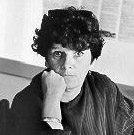 Ellen Dudley, winner of a Vermont Council on the Arts Fellowship, is the author of Slow Burn (Provincetown Arts Press, 1997) and her work has appeared in such magazines as TriQuarterly, Agni, Massachusetts Review and The Poetry Miscellany. She is founding editor and publisher of the Marlboro Review and lives in Marlboro, Vermont.
JH: Ellen, when did you found the Marlboro Review—and why? Ellen Dudley, winner of a Vermont Council on the Arts Fellowship, is the author of Slow Burn (Provincetown Arts Press, 1997) and her work has appeared in such magazines as TriQuarterly, Agni, Massachusetts Review and The Poetry Miscellany. She is founding editor and publisher of the Marlboro Review and lives in Marlboro, Vermont.
JH: Ellen, when did you found the Marlboro Review—and why?
ED:I founded MR in 1995 because I despaired in trying to get my own work published. My first book, Slow Burn, was rejected 69 times before Chris Busa of Provincetown Arts Press took it. It was once a finalist in a well-known contest held by a press for "women's voices" where it was rejected for its content. And I thought it would never see the light of day. These experiences left me with a bitter taste I felt I couldn't rid myself of and I thought I needed to do something pro-active (I just don't like that word!) to make myself keep on keeping on. I couldn't make people publish my work but I thought I could put myself in a position where I could see about getting tough and risky work like mine out into the air. A couple of years before I had graduated with an MFA from Warren Wilson College Program for writers. And it was only shortly before that by three years that I had started writing. I had a book finished and I was struggling to find a publisher for the book and for individual poems and I was greeted with the great yawn. I was a new writer heady with the impression that I'd leave school and make a big splash because I'd been praised and nominated for various awards; after school I thought that would continue. I was wrong and disappointed and frustrated and at loose ends and I thought to myself that I knew lots of folks in the field, from school, from that fabulous faculty I had had access to for those years I had been there in North Carolina. And I had other recently graduated friends who wanted to keep that intense literary friendship we had developed going; so I had a couple of long talks with my husband about maybe starting a lit journal. I had recently received some "found" money from an old employer who had come into some unexpected money and shared it with those of us who had foregone salaries as the company imploded. My husband and I had a bit of money we could front the magazine till it got on its feet, until we could file for NFP status. My husband comes from a family of lawyers and is a frustrated lawyer himself, so he agreed to read the IRS guidelines for applying for status and I went off to pals from school that would perhaps consent to be editors. They jumped when I asked if they'd like to "accrue some power in publishing." After they quit giggling, they agreed: Ruth Anderson in San Diego in poetry, Helen Fremont in Boston as a fiction editor, Margaret Kaufman in the Bay area as another fiction editor (because fiction is so cumbersome I thought two people would better handle the volume). I'd do translations, reviews and essays (my favorite art form). One other necessary item I thought we needed was some sort of technical/ PC/internet (such as it was back then) expertise. I had found a new friend at Bill Matthews's workshop at the Vermont Studio Center in 1993 in the person of Rebecca Irvine Hippert of Cleveland Ohio who had many years of experience as an IT specialist at IBM. Rebecca had received her MFA from Vermont College several years prior to mine and she was very excited to be part of our enterprise. We wouldn't be the presence we are without her and her expertise. When I had these folks on board I sought out a board. Our own lawyer helped me in many ways by agreeing to be on the board and do the necessary pro-bono work. I had, after a few months, gotten a temporary letter of determination from the IRS granting us NFP status and the lawyer hadn't had to use his time up on that--we had done it. For board members, I asked Martha Rhodes--who had gone to school with me and who had started Four Way Books with some other grads--to join the board for her expertise in publishing, Dick Lewontin agreed to come on as a perennial board member for everything from the local volunteer fire company to the Marlboro Music School & Festival. He has much expertise in how boards work and how I should be gathering a board that would leave me to do what I wanted without interference. He also has for many years been a distinguished Harvard professor and essayist for the New York Review of Books. At the same time came William Matthews, a great mentor to me and a very well respected poet. Dorothy Olson and myself rounded it out. Dorothy worked for Time magazine for years, sat on NEA panels and had lots of knowledge to convey. And I was there as chief cook and bottle washer. It is a labor of love for all of us; no one has ever seen a penny from this enterprise. Alas, at the end of 1997 Bill Matthews died unexpectedly and was no longer with us at MR. Bill's death was a terrible blow to the magazine and to me personally. He was a great supporter of my book and we had signed on to do a bunch of readings together after my book came out. The book arrived two days after Bill's death. Bill's seat on the board stayed empty for some time until I found the wonderful F.D. Reeve to fill the spot. We look forward to many productive years with Franklin. JH: Is the Marlboro Review affiliated in any way with Marlboro College? If not, how does it get its funding? ED: Well, as I just said, in that explanation above, we are completely independent. It has been wonderful in that we never have to worry about funding not coming in from the institution, etc., etc. but it's also exhausting to find the money to keep it all together here. So, no, we aren't in any way affiliated with Marlboro College except that we exist in the same town. JH: As with nearly every other literary journal (including the one I edit, Perihelion), the stated criterion for acceptance is “excellence,” but the excellence you're looking for is surely different from the excellence say, Fence or Slope is looking for. To be more specific, how would you characterize poems MR tends to publish? ED: That's a tough question. I'd say what concerns us most is that craft be at work in the poem (and in the prose we publish as well). I see so much work that is nothing but fairly dull prose truncated into lines to resemble poetry on the page but resembling poetry only in that way. We like to see complexity of thought and feeling, we like a poet with an ear. We don't see any reason to use as a criterion for creation "language playing with itself” as an excuse for incoherence. So it's pretty much a given that you won't see us publishing language poets. Neither do we care for the contemporary trend to discursiveness. Neither are we stuck on the lyric. There is no one type of poetry we like more than another but there is probably the poem we like more than another. We publish Si Perchik and have throughout the years; he is as close as we come as the above description probably. We like the old fashioned notion of coherence and of communication. The notion that "I write only for myself" is as foreign to me as anything I can think of. I write to communicate to others and basically I believe what the novelist and short story writer Alison Moore says that "I believe we (men and women) aren't that different under the skin, that we all want pretty much the same things: love, kindness, truth." I don't believe in an "authenticity of experience" as reason to accept or praise a poem. We pretty much don't care what a poet's ethnicity or religion or anything else like that is. What we do care about is the way the poem is constructed, or that it sings to us. To equate excellence with experience seem to me to be a patently false way to accord acceptance. That's the way it was under the "dead white guys,” praised, published and held up for their authenticity of experience. I am just disinclined to use "who one is" as a substitute for a beautifully crafted thing. JH: Is it difficult to find publishable poems? Why or why not? ED: No, not at all. Sometimes you just have to go through reams and reams of junk before you hit the diamond. But the diamonds are indeed there. I often will solicit work say after a reading or a class or something like that. I read at an anti-war reading in May of this year where two college students also read. I thought each of these young women read something wonderful and I told them so. I passed out my card to them and asked them to send some work to us. Sometimes when work gets to us after one of these events the poems are wonderful and sometimes they aren't. But we have to try. That's just the way it goes. Over time I get some pretty good work for MR in that way. Reading through submissions can be just exhausting. I have just recently quit reading in the summer because it was just an untenable situation. When the academically affiliated magazines quit reading from to May to September, our submissions were increasing nearly 100%. At first I thought I was nuts and it couldn't be that big, but after I started counting there was no error. It was just too much so I quit. I read every single piece of paper that comes into this office and many of the submissions go on to the respective editors and some don't. But folks who send here are for the most part being screened by me. Every once in a while I have help...but the help is not an undergraduate screener. There is lots of good work out there in the world. JH:What are some of the major turnoffs in poetry for you as an editor? ED: I wish writers would be a little more solicitous toward us sometimes. Yes, I know, I used to cuss out editors too. But I have new respect for folks who do this job. It is mostly a thankless and tiring task. But it is also a labor of love. There is nothing quite as good as that feeling when you find some piece of extraordinary work and offer some new poet or prose writer their first publication ever. There's that heady power I offered all the editors in jest those years ago! Other turnoffs I have mostly addressed in the previous question: the substitution of "authenticity" for craft, the dull discursiveness, or in Heaney's words (when speaking to Donald Hall) some years back and lamenting of American poems: "Aye, they lack song." Well, yes, I'd say that's a major problem in contemporary poetry, especially in the US. JH: Do you reject poems with “fixable” problems, or do you work with the poet to correct? What do you consider “fixable”? ED: Actually, in the last eight years of our existence (Eight Years?) we have asked a poet to change something in a poem perhaps three or four times. Our feeling here is that when a poet sends out his or her work that (s)he has worked long and hard to finish it and we should respect that. If the poem is lousy, it's lousy and the person needs to work harder from the get-go. I have once or twice asked poets to change things to make design easier but they both acted as if I had slapped them so sometimes the poems don't look as good on the page as they might. In this business there is give and take as there is in any other and we just try to work with people as well as we can. JH:Does MR mainly publish from submissions, from solicitations, or both? ED: We do both. Above I explained how we sometimes find work to solicit. I do this and so does Ruth (poetry editor, Ruth Anderson). If she has found something in her travels she'd like to publish she'll run it by me and then we'll go ahead and do it. I talk with all my editors during the design phase of an issue. We are doing that now in late June/early July as the issue comes together. I put the magazine together and I generally give the final yes or no to a piece because things have to fit together in the end. I also know a lot of well-established writers as do our editors and sometimes if we see someone at an event we'll ask them to send things in for us to consider. Sometimes our board members will also solicit work from writers they meet as well. I should also say that we have a group of excellent contributing editors, many of whom teach, and they are very good about sending exciting new work all the time. Sometimes they will send it to us themselves and other times they just ask the writer to send the work directly to us with a cover letter mentioning the contributing editor's name as well. JH: Which literary journals do you admire and why? ED: I like TriQuarterly, Agni (and not just because they have historically published my work and that of folks I admire) because they seem to like a wide expanse of styles while still attending to the primacy of craft. I also love Manoa, for its international perspective and for the new and interesting voices they publish. And it is probably the most beautifully designed literary journal extant and for that I envy and admire them. I also admire Granta for its consistent attention to good prose writing; Granta is the one journal I subscribe to religiously and have for years. JH: In some ways, the editor of a poetry publication is a de facto critic because selection/non-selection indicates a judgment that can populate the contemporary poetry landscape with poems to be seen by others. Do you see yourself in a role as gatekeeper in some sense? ED: You bet I do. I think it's part of our job as editors. JH: Is there a danger in poets waiting too long to try and publish? How about the danger, if any, in publishing too soon? ED: Well, I can really relate to the idea of poets waiting too long to publish. I didn't know I was a poet till I was over 35 years of age. I wish I had known what it was I should have been doing earlier; I wish I'd gotten a couple of books done when I was fairly young. I felt as if I wasted a lot of time. One of the reasons I went to an MFA program was because I felt like a dunce in the company of other writers and I thought I had to catch up. I don't feel that pressure so much now. I have one book in print, another just finished and a third I'm at work on. Hey, that's that; if I drop dead tomorrow, that's my oeuvre. I often think of my friend George Mills who won the Samuel French Morse prize for his book The House Sails Out of Sight of Home at 71. There were more poems and some chapbooks but as it turned out, George didn't have all that many years left and when he died in 1998 he left a lot undone. I wish we'd had more of him. And as for publishing too soon; yes, people do it and do it too much. When I get work from the unformed I advise them to do an apprenticeship. Go get a good teacher, form a good poetry group. Do the work; learn the craft. JH: In the years of MR's existence, have you noticed a trend in types of submissions? A change in overall quality? Something else? ED: Well, as I said, the discursive bug seems to have bitten entirely too many people. And there is too much incoherence out there. Lately I see a lot of what I call the "non-sequitur poem." There is a line containing a very often vivid image followed by a line containing another image, often more vivid but totally unrelated. This poem catches the reader's eye and bounces it around and continues to do it over and over. And because we have been moved around at such a rate we assume we have arrived somewhere. But where? Certainly not a conclusion. And the reader is often fooled into thinking this is a new sort of home (s)he has come too. But, really, nothing has happened. Nothing at all. JH: Finally, based on your experience, what advice do you have for poets who are just now trying to get published? ED: Read. Read it all. And make sure you have done your apprenticeship before trying to publish. And, please, support the journals you expect to publish you. If I had 5% of the people submitting subscribing, we'd be doing very well. You needn't subscribe to all journals; spread it around from year to year. But it seems to me just plain bad manners to swamp small magazines with work when you have no interest in keeping them alive by supporting them. It is, at bottom, like the rabbi said: treat others the way you'd like to be treated; the rest is commentary. JH: Thank you, Ellen Dudley, for a most invigorating and enlightening interview.
2020 Pennsylvania Ave., NW Suite 443 Washington, D.C. 20006 algonkian@webdelsol.com Phone: 703-281-4426 |

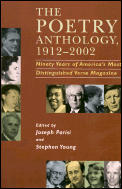 The Poetry Anthology, 1912-2002:
The Poetry Anthology, 1912-2002: 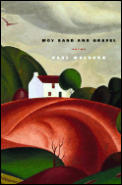 Moy Sand and Gravel
Moy Sand and Gravel
 The Poetics of Space
The Poetics of Space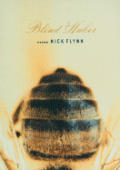 Blind Huber
Blind Huber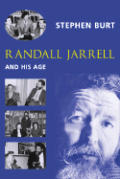 Randall Jarrell and His Age
Randall Jarrell and His Age